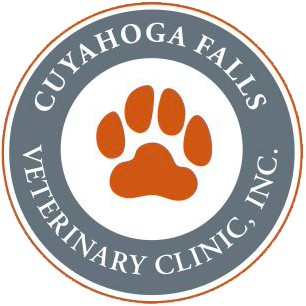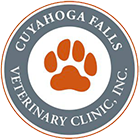Taking good care of our senior patients is a top priority at the Cuyahoga Falls Veterinary Clinic. We’ve touched on a number of senior-related issues in previous blog posts (such as Silver Screen: For Your Senior Pet’s Health).
The following article appeared in fetch! Magazine not that long ago. Because it fits with our philosophy of geriatric medicine, we would like to share it here in the first of three parts.
Seven Rules for the Over Seven Set
by Ernie Ward, DVM
Pets don’t get old — at least, they don’t know it. The simple fact that dogs and cats can’t tell time or read a calendar means they don’t know they should stop behaving as if they’re puppies or kittens because they’ve reached a “certain age.” Unlike their human counterparts, older pets don’t see age as an excuse to stop playing ball, chasing dust bunnies and being lively.
START TESTING AT AGE SEVEN
As a pet enters its senior years, physiological changes often occur. Changes in kidney, liver and pancreatic function; arthritis, cataracts, heart disease and high blood pressure are more common in older pets. The most important key to treating disease is early recognition. In medicine, we have a rule called “The 10/90 Rule.” This means that if we diagnose most diseases, especially cancers, during the first 10% of development, we have about a 90% chance of successfully treating or even curing it. 
However, if we don’t diagnose it until it’s obvious or 90% established, the odds of success plummet to about 10%. To diagnose a disease in the early stages requires consistent examinations and lab tests. As soon as your pet turns seven, you should ask for basic blood and urine tests, even if your pet appears to be perfectly healthy. The value of routine testing is that it establishes baselines for future reference.
Recently I saw a 10-year-old cat for a routine exam. The owner reported her cat was in splendid condition. Our test results showed a big jump in two kidney enzymes from previous years. While the values were still within normal limits, the increase caught my attention and we performed additional tests that confirmed early kidney disease. If we did not have the previous test results, we would’ve never diagnosed the disease at this early stage.
The money you spend on routine diagnostics may save you big bucks in the future and add years to your pet’s life. Twenty years ago, a 12-year-old pet was considered over the hill. Nowadays, I rarely meet a pet owner who thinks of her 12-year-old pet as old. In fact, more and more veterinarians are reporting dogs aged 19-to-20 years and cats older than age 20. If you’re getting a late start, don’t worry. You can teach an old pet (owner) new tricks.
By following a few simple rules, you can help your pet live to its fullest – and longest – potential.
FOOD & SUPPLEMENTS
As dogs and cats age, so do their nutrient requirements and ability to digest certain foods. If your pet is over seven, talk to your veterinarian about switching to a diet specially-formulated for older pets. I prefer low- or no-grain higher protein diets for older cats and highly digestible, low-fat diets for dogs.
Because nutritional gaps and cellular damage can accelerate as pets age due to genetics, pollutants and illness, I recommend giving nutritional supplements such as Omega-3 fatty acids (fish oils), glucosamine/chondroitin sulfate, and a good multi-vitamin (especially B vitamins and vitamins A, D, E, and K, biotin and beta-carotene) to almost every older pet. I also prescribe SAM-e, silybin/milk thistle, superoxide dismutase (SOD) and probiotics to many senior pets to combat age changes and maintain optimal immune response.
Written by Dr. Ernie Ward
Originally written for fetch! magazine, a Petplan pet insurance magazine. Learn more about Petplan at www.gopetplan.com
Reproduced with permission from the author and editor.
Dr. Ward shared some very wise advice this week. As much as we don’t want to think about our pets getting old, the fact is that they do age, and they age faster than we know, especially once they reach 7 years old. This is why we have put the Silver Screen program in place: to set up baselines for our patients in the early part of their senior years. This has proven invaluable for many of our patients, and it is a good idea for you to consider. And, good nutrition cannot be overlooked either, as a healthy body is dependent upon a healthy diet.
Stay tuned for Part 2 of Seven Rules for the Over Seven Set, coming soon to a Cuyahoga Falls Veterinary Clinic Blog near you!


The Cuyahoga Falls Veterinary Clinic | Animal Wellness | Medical Services | Pet Services
[…] a comprehensive preventive health care package for our senior patients called a Silver Screen. For patients 7 years and older, a Silver Screen takes a broad look at the outside and inside of your dog and/or cat […]
The Cuyahoga Falls Veterinary Clinic | Animal Wellness | Medical Services | Pet Services
[…] The following article appeared in fetch! Magazine not that long ago. Because it fits with our philosophy of geriatric medicine, we would like to share it here in the second of three parts. Picking up where we left off with Part 1… […]
Tweets that mention The Cuyahoga Falls Veterinary Clinic | Animal Wellness | Medical Services | Pet Services -- Topsy.com
[…] This post was mentioned on Twitter by Petplan Insurance US, Veterinary Clinic. Veterinary Clinic said: @Petplan: Thx 4 the promo! #senior #pet #dog #cat http://bit.ly/ca9Szo […]
The Cuyahoga Falls Veterinary Clinic | Animal Wellness | Medical Services | Pet Services
[…] Seven Rules for the Over Seven Set, Pt. 1 […]
The Cuyahoga Falls Veterinary Clinic | Animal Wellness | Medical Services | Pet Services
[…] We’ve welcomed the thoughts of Ernie Ward, DVM, to our blog before, and he’s got some good things to share about vaccines. The following is taken from his article, Vaccination Nation, that appeared in volume 6 of fetch! magazine. In part one, we’ll cover kittens. Here goes! […]
The Cuyahoga Falls Veterinary Clinic | Animal Wellness | Medical Services | Pet Services
[…] the senior dogs, take them for a slow leash-walk around the block. If you make it back and they’re still […]
The Cuyahoga Falls Veterinary Clinic | Animal Wellness | Medical Services | Pet Services
[…] disease is easier when it is caught early on in the process rather than late. Routine screening in senior patients is so important in maintaining health. Should kidney disease show up, we have significant […]
The Cuyahoga Falls Veterinary Clinic | Animal Wellness | Medical Services | Pet Services
[…] We’ve welcomed the thoughts of Ernie Ward, DVM, to our blog before, and he’s got some good things to share about vaccines. The following is taken from his article, Vaccination Nation, that appeared in volume 6 of fetch! magazine. In part two, we’ll cover puppies (kittens were in part one). Here goes! […]